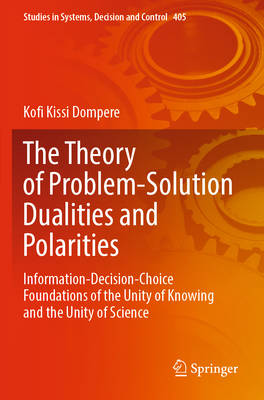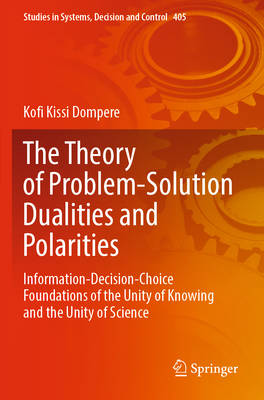
- Retrait gratuit dans votre magasin Club
- 7.000.000 titres dans notre catalogue
- Payer en toute sécurité
- Toujours un magasin près de chez vous
- Retrait gratuit dans votre magasin Club
- 7.000.0000 titres dans notre catalogue
- Payer en toute sécurité
- Toujours un magasin près de chez vous
The Theory of Problem-Solution Dualities and Polarities
Information-Decision-Choice Foundations of the Unity of Knowing and the Unity of Science
Kofi Kissi Dompere
158,45 €
+ 316 points
Format
Description
This book is concerned with the development of the understanding of the relational structures of information, knowledge, decision-choice processes of problems and solutions in the theory and practice regarding diversity and unity principles of knowing, science, non-science, and information-knowledge systems through dualistic-polar conditions of variety existence and nonexistence. It is a continuation of the sequence of my epistemic works on the theories on fuzzy rationality, info-statics, info-dynamics, entropy, and their relational connectivity to information, language, knowing, knowledge, cognitive practices relative to variety identification-problem-solution dualities, variety transformation-problem-solution dualities, and variety certainty-uncertainty principle in all areas of knowing and human actions regarding general social transformations. It is also an economic-theoretic approach in understanding the diversity and unity of knowing and science through neuro-decision-choice actions over the space of problem-solution dualities and polarities. The problem-solution dualities are argued to connect all areas of knowing including science and non-science, social science, and non-social-science into unity with diversities under neuro-decision-choice actions to support human existence and nonexistence over the space of static-dynamic dualities. The concepts of diversity and unity are defined and explicated to connect to the tactics and strategies of decision-choice actions over the space of problem-solution dualities. The concepts of problem and solution are defined and explicated not in the space of absoluteness but rather in the space of relativity based on real cost-benefit conditions which are shown to be connected to the general parent-offspring infinite process, where every solution generates new problem(s) which then generates a search for new solutions within the space of minimum-maximum dualities in the decision-choice space under the principle of non-satiation over the space of preference-non-preference dualities with analytical tools drawn from the fuzzy paradigm of thought which connects the conditions of the principle of opposites to the conditions of neuro-decision-choice actions in the zone of variety identifications and transformations. The Monograph would be useful to all areas of Research, Learning and Teaching at Advanced Stages of Knowing and Knowledge Production.
Spécifications
Parties prenantes
- Auteur(s) :
- Editeur:
Contenu
- Nombre de pages :
- 270
- Langue:
- Anglais
- Collection :
- Tome:
- n° 405
Caractéristiques
- EAN:
- 9783030902810
- Date de parution :
- 27-04-23
- Format:
- Livre broché
- Format numérique:
- Trade paperback (VS)
- Dimensions :
- 156 mm x 234 mm
- Poids :
- 480 g

Les avis
Nous publions uniquement les avis qui respectent les conditions requises. Consultez nos conditions pour les avis.






